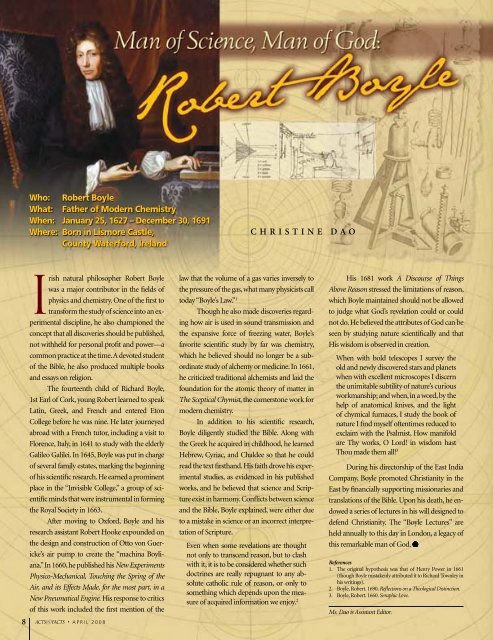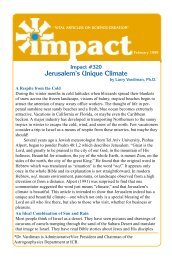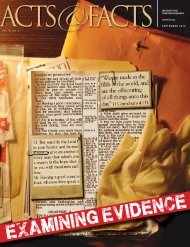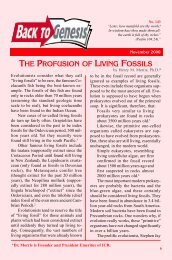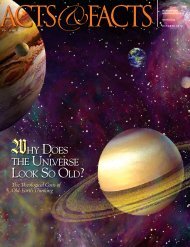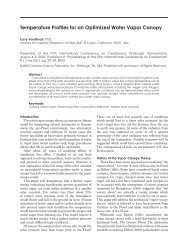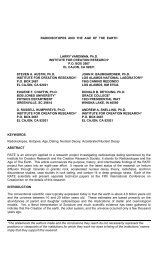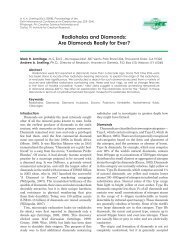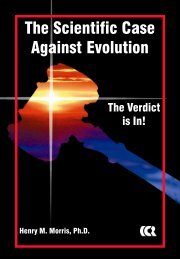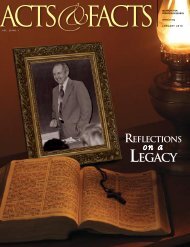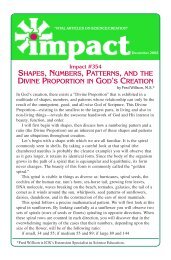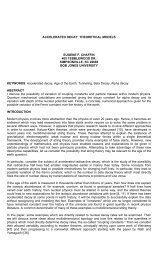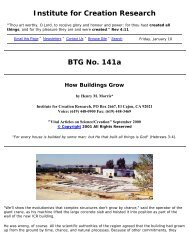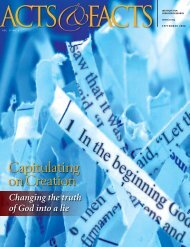Download April 2008 PDF - Institute for Creation Research
Download April 2008 PDF - Institute for Creation Research
Download April 2008 PDF - Institute for Creation Research
You also want an ePaper? Increase the reach of your titles
YUMPU automatically turns print PDFs into web optimized ePapers that Google loves.
Who: Robert Boyle<br />
What: Father of Modern Chemistry<br />
When: January 25, 1627 – December 30, 1691<br />
Where: Born in Lismore Castle,<br />
County Water<strong>for</strong>d, Ireland<br />
Irish natural philosopher Robert Boyle<br />
was a major contributor in the fields of<br />
physics and chemistry. One of the first to<br />
trans<strong>for</strong>m the study of science into an experimental<br />
discipline, he also championed the<br />
concept that all discoveries should be published,<br />
not withheld <strong>for</strong> personal profit and power—a<br />
common practice at the time. A devoted student<br />
of the Bible, he also produced multiple books<br />
and essays on religion.<br />
The fourteenth child of Richard Boyle,<br />
1st Earl of Cork, young Robert learned to speak<br />
Latin, Greek, and French and entered Eton<br />
College be<strong>for</strong>e he was nine. He later journeyed<br />
abroad with a French tutor, including a visit to<br />
Florence, Italy, in 1641 to study with the elderly<br />
Galileo Galilei. In 1645, Boyle was put in charge<br />
of several family estates, marking the beginning<br />
of his scientific research. He earned a prominent<br />
place in the “Invisible College,” a group of scientific<br />
minds that were instrumental in <strong>for</strong>ming<br />
the Royal Society in 1663.<br />
After moving to Ox<strong>for</strong>d, Boyle and his<br />
research assistant Robert Hooke expounded on<br />
the design and construction of Otto von Guericke’s<br />
air pump to create the “machina Boyliana.”<br />
In 1660, he published his New Experiments<br />
Physico-Mechanical, Touching the Spring of the<br />
Air, and its Effects Made, <strong>for</strong> the most part, in a<br />
New Pneumatical Engine. His response to critics<br />
of this work included the first mention of the<br />
8 ACTS&FACTS • APRIL <strong>2008</strong><br />
ChrisTine Dao<br />
law that the volume of a gas varies inversely to<br />
the pressure of the gas, what many physicists call<br />
today “Boyle’s Law.” 1<br />
Though he also made discoveries regarding<br />
how air is used in sound transmission and<br />
the expansive <strong>for</strong>ce of freezing water, Boyle’s<br />
favorite scientific study by far was chemistry,<br />
which he believed should no longer be a subordinate<br />
study of alchemy or medicine. In 1661,<br />
he criticized traditional alchemists and laid the<br />
foundation <strong>for</strong> the atomic theory of matter in<br />
The Sceptical Chymist, the cornerstone work <strong>for</strong><br />
modern chemistry.<br />
In addition to his scientific research,<br />
Boyle diligently studied the Bible. Along with<br />
the Greek he acquired in childhood, he learned<br />
Hebrew, Cyriac, and Chaldee so that he could<br />
read the text firsthand. His faith drove his experimental<br />
studies, as evidenced in his published<br />
works, and he believed that science and Scripture<br />
exist in harmony. Conflicts between science<br />
and the Bible, Boyle explained, were either due<br />
to a mistake in science or an incorrect interpretation<br />
of Scripture.<br />
Even when some revelations are thought<br />
not only to transcend reason, but to clash<br />
with it, it is to be considered whether such<br />
doctrines are really repugnant to any absolute<br />
catholic rule of reason, or only to<br />
something which depends upon the measure<br />
of acquired in<strong>for</strong>mation we enjoy. 2<br />
His 1681 work A Discourse of Things<br />
Above Reason stressed the limitations of reason,<br />
which Boyle maintained should not be allowed<br />
to judge what God’s revelation could or could<br />
not do. He believed the attributes of God can be<br />
seen by studying nature scientifically and that<br />
His wisdom is observed in creation.<br />
When with bold telescopes I survey the<br />
old and newly discovered stars and planets<br />
when with excellent microscopes I discern<br />
the unimitable subtility of nature’s curious<br />
workmanship; and when, in a word, by the<br />
help of anatomical knives, and the light<br />
of chymical furnaces, I study the book of<br />
nature I find myself oftentimes reduced to<br />
exclaim with the Psalmist, How manifold<br />
are Thy works, O Lord! in wisdom hast<br />
Thou made them all! 3<br />
During his directorship of the East India<br />
Company, Boyle promoted Christianity in the<br />
East by financially supporting missionaries and<br />
translations of the Bible. Upon his death, he endowed<br />
a series of lectures in his will designed to<br />
defend Christianity. The “Boyle Lectures” are<br />
held annually to this day in London, a legacy of<br />
this remarkable man of God.<br />
References<br />
1. The original hypothesis was that of Henry Power in 1661<br />
(though Boyle mistakenly attributed it to Richard Townley in<br />
his writings).<br />
2. Boyle, Robert. 1690. Reflections on a Theological Distinction.<br />
3. Boyle, Robert. 1660. Seraphic Love.<br />
Ms. Dao is Assistant Editor.


